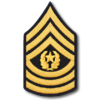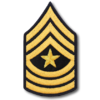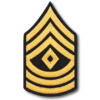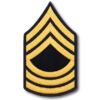-
Lieutenant Colonel
 O-5 | LTC
O-5 | LTCThe Lieutenant Colonel has proven himself as the Regimental Executive Officer, serving at the Commanding Officer's right hand, and even in his stead when necessary. The LTC, as Executive Officer, oversees all day to day operations and activities of the Regiment at the direction of the Commanding Officer. His is a trusted and wise voice in the Command Staff as well, always assisting his Company Commanders and other junior officers.
-
Major
 O-4 | MAJ
O-4 | MAJThe Major is a Field Grade officer, one who is proven at all levels and can now be trusted with responsibilities that span the whole Regiment. The Major can serve as the Battalion Commander, Regimental Staff Officer, or even Regimental Executive Officer. All eyes are on the Major, for he assists the leadership of the Regiment in all areas.
-
Captain
 O-3 | CPT
O-3 | CPTTo be promoted to Captain is to be the standard of excellence as a Company Commander and an Officer. The Captain enjoys universal respect from his soldiers and fellow Officers and has made the Regiment a better place because his Company has been made ever stronger.
-
First Lieutenant
 O-2 | 1LT
O-2 | 1LTThe First Lieutenant has proven him/herself as a competent Platoon Leader. He has earned the confidence of his soldiers and continues to improve his Platoon, Company and the Regiment as a whole.
-
Second Lieutenant
 O-1 | 2LT
O-1 | 2LTAs the PV2 is the junior soldier and the CPL is the junior NCO, the Second Lieutenant is a junior Commissioned Officer, learning what it means to no longer wear stripes. Second Lieutenants are freshly minted Platoon Leader, and do well to take heed the advise of their Platoon Sergeant & First Sergeants. They also have a seat at the table of Command Staff, but also do well to listen more than speak.
-
Officer Candidate
 E-5 | OCS
E-5 | OCSOfficer Candidate School (OCS) is the U.S. Army's main training academy for prospective Army Officers. The school is generally open to qualified enlisted non-commissioned officers. Candidates who successfully complete the training and selection, receive formal commissions as U.S. Army Officers and assume the ability to command Soldiers.
-
Command Sergeant Major
 E-9 | CSM
E-9 | CSMThe Command Sergeant Major is the commanding senior NCO of any command element. With a background of excellence in all areas of leadership including Company First Sergeant, the Command Sergeant Major represents the height of accomplishment in the NCO Corps. The Command Sergeant Major is a beast of his own and not to be trifled with.
-
Sergeant Major
 E-9 | SGM
E-9 | SGMThe Sergeant Major is the principal Senior NCO of the Battalion. With a background of excellence in all areas of leadership including Company First Sergeant, the Sergeant Major represents the height of accomplishment in the NCO Corps. The Sergeant Major can move mountains, part the skies and place his boot where he wishes.
-
First Sergeant
 E-8 | 1SG
E-8 | 1SGWhen you are talking about the First Sergeant you are talking about the lifeblood of the Army. There can be no substitute of this position nor any question of its importance. When First Sergeants are exceptional, their units are exceptional, regardless of any other single personality involved. Perhaps their rank insignia should be the keystone rather than the traditional diamond. It is the First Sergeant at whom almost all unit operations merge. The First Sergeant holds formations, instructs platoon Sergeants, advises the Commander, and assists in training of all enlisted members.
-
Master Sergeant
 E-8 | MSG
E-8 | MSGThe rank of Master Sergeant says it all: Master of the art of leadership. The Master Sergeant serves as the principal NCO in staff elements at company and often higher levels. Although not charged with the enormous leadership responsibilities of the First Sergeant, the Master Sergeant is expected to dispatch leadership and other duties with the same professionalism and to achieve the same results as the First Sergeant.
1) Four (4) months Time in Grade (TIG).
2) Demonstrated success at all levels of NCO leadership.
3) Is an example to be followed in all areas.
4) Ability to assist the Command Staff where necessary.
5) Recommendation from the Commanding Officer of the Regiment.
